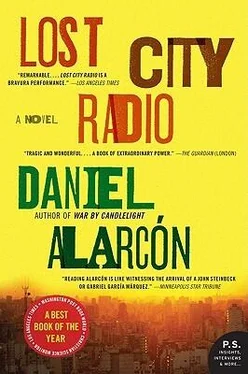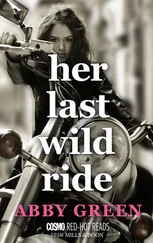Rey strained to see through the black cloth. There was only darkness. “You’ve never heard of it.”
“Junior’s read books. You should try him.”
“He’s from the city,” one of the other prisoners said.
“No one’s talking to you,” a soldier snapped.
They all laughed. They were just kids. Rey pretended he was somewhere else: flying, yachting even. He’d never done either. One of the village men had begun to sob. Rey was seated between the two of them, men about whom he knew very little. Why were they here? The man to his left was shaking. “Where are we going?” he asked, but the soldiers ignored him. Instead, the one named Junior said, “How’d you end up here, city boy?”
It took Rey a moment to realize they meant him. He sighed. “I’m not from the city.”
“IL piece of shit.”
“There’s no such thing,” Rey said, and he felt the business end of a rifle jab his gut. There was laughter.
“Keep talking, funny guy.”
“You’re famous,” another voice said. “You’re thinner than I thought you’d be. They say you plant bombs and kill cops. They say you invented tire-burning.”
Rey blinked against the blindfold.
“I bet you want to go home.”
“I bet he does.”
“But sometimes we don’t get what we want.”
The road out of 1797 had been bumpy, but the jeep managed, and once they were moving, everything changed. The smells changed, and the quality of the heat that surrounded them. The forest was not a monolithic entity: it was many places all at once. He’d been down this road that led away from 1797: grown over with vines, and above, a thick canopy of trees that broke only rarely. It was cool and damp. He listened: they had turned and were approaching the water. He’d been here as well, on one of his trips to the camps. At the riverbank, he was separated from the two village men. One of them begged: “I’ll tell you everything!” He pleaded with such ferocity that Rey had to wonder what it was the man knew.
Then they put him on a raft, hands still tied, eyes still blind. By the sounds of it, Rey felt the platoon had shrunk, or broken into smaller units. There were three or four soldiers with him. He couldn’t tell. It didn’t matter. Yachting, Rey said to himself, for the last time. In the middle of the river, where the trees did not reach, there was golden sunlight, and for a moment, Rey allowed himself to take in its warmth. He luxuriated in it; he let the light make colors behind his eyelids, let it illumine scenes and images of people and places he loved and would never see again. These are the small moments one can appreciate fully only when death is near. “We’re almost there,” a voice said after a while, and Rey knew this to be the truth. They hadn’t come far, but then the camp had never been that far from 1797. A bend in the river, a hike into the forest from the bank. Two hours downstream at most. The water was calm. Rey was calm. If he hadn’t been blindfolded, he might have enjoyed the scenery: his beloved forest, the earth at its most garishly alive. Even from this vantage point, with most of its secrets hidden beyond the banks, it was impossible not to be impressed. These were the dark places that had enchanted him his entire life: he listened for the humming of the jungle, for a bird call or the chirrup of a red monkey. What had he come here for — in the beginning? Norma, he thought and, saying it softly to himself, he felt comforted. What had he come looking for, when he had everything? He’d had her. Norma, he said again, and her name was like the final word of a prayer.
“You’re going to kill me, aren’t you?” he asked in the dark.
No one answered him, but then, no one had to. The sun warmed his face. A drop of sweat rolled down his forehead, beneath the blindfold and into his right eye. He nodded. “All right,” he said, blinking. “All right, okay then.” He was still nodding when the soldier everyone called Junior shot him in the chest.
Rey died instantly.
They were all boys, and though the prisoner was a stranger to them, they each mourned him in their private way. The war was ending, and Rey’s was one of the last bodies they would see. A battle awaited them at the camp, of course, but that would come tomorrow, and they would not fight it alone. They would come upon a tired band of IL fighters, among them a man named Alaf, who, like many others, would die before firing a shot. But that would be all noise and light, whereas Rey’s was a smaller, more intimate death. One of them pulled the silver chain from around the dead man’s neck. They checked his pockets, hoping to find money, but there was only a handwritten letter, of no use to anyone. They stared at Rey. From another raft on the river, a grinning soldier gave them a thumbs-up. One of them pulled off the dead man’s blindfold and closed his eyelids; another took his shoes. For many minutes, no one spoke. They let the current carry them, and they watched Rey, as if expecting him to speak. Finally, it fell upon Junior, who was the oldest, a three-year veteran, a boy of nineteen, to push the bound man’s body off the raft and into the river. It made a small splash, and, for a quarter-mile, it floated alongside them, bobbing and sinking facedown in the river. Still, no one spoke. One of the younger soldiers, of his own initiative, used the oar to push Rey’s body toward the shore. With this accomplished, they all felt better.
SINCE 1999, when I began researching this novel, many people have shared their stories of the war years with me. There is no way to repay this generosity and trust.
I couldn’t do anything without my family — Renato, Graciela, Patricia, Sylvia, Pat, Marcela, and Lucia — and my friends, scattered in two dozen countries, but always near to my heart.
Vinnie Wilhelm, Mark Lafferty, and Lila Byock provided invaluable feedback on early drafts of this novel, for which I am immensely grateful.
Daniel Alarcón’s story collection, War by Candle light, was a finalist for the 2006 PEN/Hemingway Award. He is the associate editor of Etiqueta Negra , an award-winning monthly magazine published in his native Lima, Peru. He lives in Oakland, California.
Visit www.AuthorTracker.com for exclusive information on your favorite HarperCollins authors.












